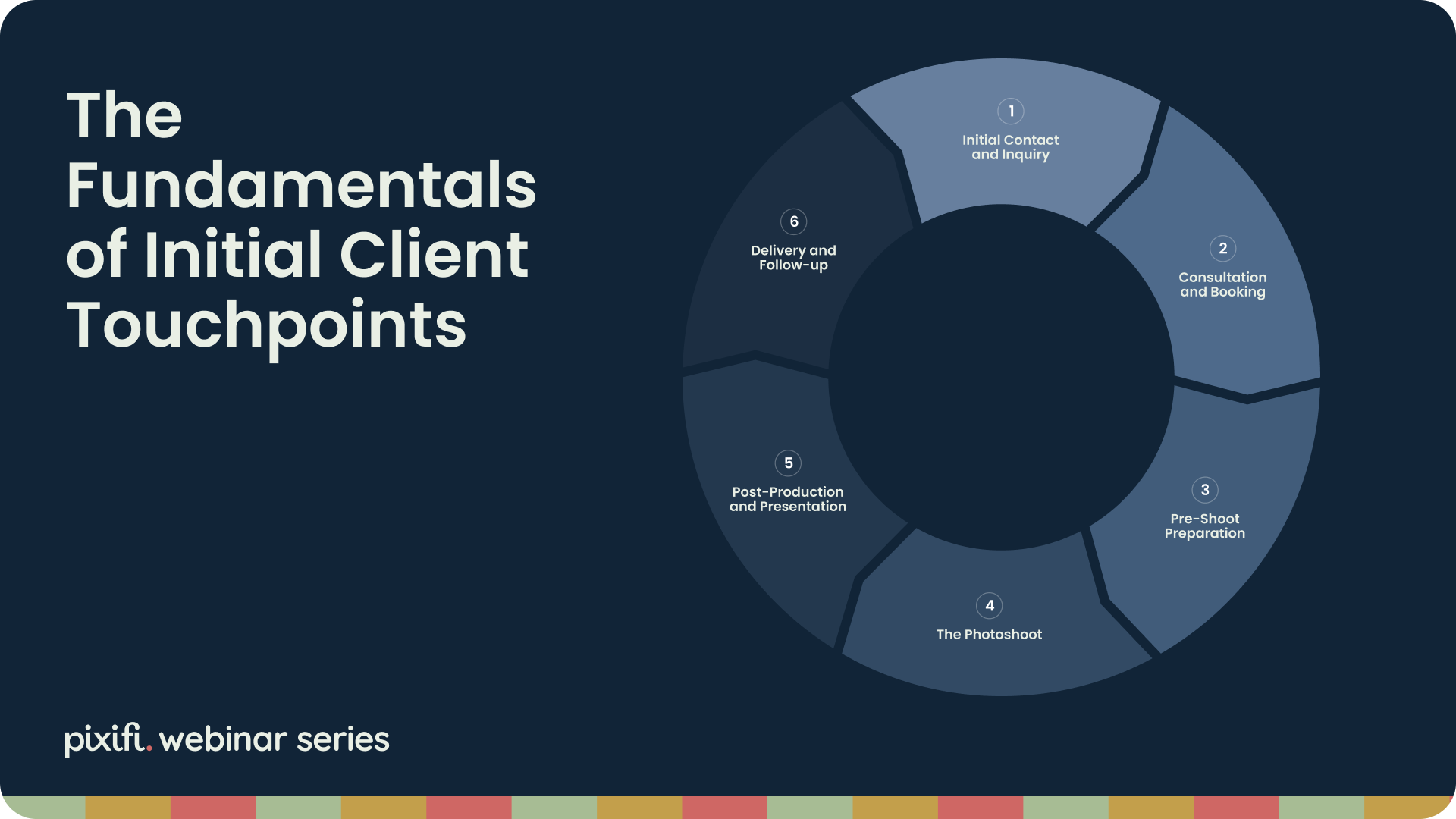Creating Deeper Client Connections Through CRM: A New Approach for Photographers
In today's highly competitive business environment, strong client connections are more important than ever. Building and maintaining relationships with clients is key to success, and one effective tool for accomplishing this is Customer Relationship Management (CRM). By harnessing the power of CRM, businesses can deepen their connections with clients, personalize interactions, streamline communication processes, leverage client data for retention strategies, and ultimately enhance overall business growth. In this article, we will explore the various ways CRM can be utilized to create deeper client connections and how to overcome challenges in its implementation.
Understanding the Power of CRM
CRM serves as a comprehensive system that allows businesses to manage and analyze interactions with their clients. Its primary goal is to improve customer satisfaction and drive business growth. CRM provides valuable insights into client behavior, preferences, and needs by centralizing client information and consolidating data from various touchpoints. This understanding enables businesses to tailor their offerings and services to meet clients' expectations better. Moreover, CRM facilitates effective team communication and collaboration, leading to optimized workflows and improved customer service.
But let's delve deeper into CRM's role in business operations. CRM acts as a single source of truth for client data, ensuring that all relevant information is easily accessible and up-to-date. This accessibility allows businesses to develop personalized marketing campaigns, target specific client segments, and deliver a consistent brand experience. With CRM, businesses can track and analyze customer interactions across multiple channels, such as email, phone, and social media, providing a holistic view of each client's journey.
The Role of CRM in Business
CRM plays a critical role in modern business operations. It acts as a single source of truth for client data, ensuring that all relevant information is easily accessible and up-to-date. This accessibility allows businesses to develop personalized marketing campaigns, target specific client segments, and deliver a consistent brand experience. CRM also enables efficient lead management, effective sales tracking, and streamlined customer support processes, enhancing productivity and increasing client satisfaction.
Furthermore, CRM empowers businesses to build long-lasting relationships with their clients. Businesses can proactively anticipate client needs and provide personalized recommendations by analyzing client behavior and preferences. This level of personalization fosters trust and loyalty, leading to repeat business and positive word-of-mouth referrals.
Key Features of Effective CRM Systems
Effective CRM systems possess several key features that contribute to successful client connections. These include:
- Centralized Client Database: Storing client information in a centralized database ensures that it is easily accessible and accurate. Businesses can effortlessly retrieve client details, such as contact information, purchase history, and communication records, enabling them to provide personalized and targeted services.
- Customizable Dashboards and Reports: Dashboards and reports provide real-time insights into client interactions, allowing businesses to make data-driven decisions. With customizable dashboards, businesses can monitor key performance indicators, track sales pipelines, and identify areas for improvement.
- Automation and Workflow Management: Automating repetitive tasks and streamlining workflows reduces manual errors and saves time, enabling teams to focus on building stronger client connections. CRM systems offer automation features, such as email templates, task reminders, and lead scoring, to streamline processes and enhance efficiency.
- Integration with Communication Channels: CRM systems that integrate with various communication channels, such as email, phone, and social media, allow businesses to track and manage interactions effectively. This integration ensures that no customer communication is missed, providing a seamless experience across all touchpoints.
By incorporating these key features, businesses can harness the full potential of CRM systems and unlock a multitude of benefits. From improved customer satisfaction to increased sales and productivity, CRM is a powerful tool that drives business success in today's competitive landscape.
Building Stronger Relationships with CRM
One of CRM's primary goals is to strengthen clients' relationships. By leveraging CRM, businesses can personalize client interactions and streamline communication processes.
Implementing a robust CRM strategy goes beyond just managing customer data; it involves creating meaningful connections that resonate with clients on a personal level. By utilizing CRM tools effectively, businesses can gain valuable insights into client behavior, preferences, and engagement history. This deep understanding allows for the creation of targeted marketing campaigns that speak directly to the individual needs of each client, fostering a sense of loyalty and long-term engagement.
Personalizing Client Interactions
Every client is unique and expects personalized interactions. CRM systems enable businesses to capture and analyze client data, such as preferences, purchase history, and demographics. By understanding each client's needs and preferences, businesses can tailor their marketing messages, product recommendations, and customer support interactions. Personalized interactions foster a sense of loyalty and trust, strengthening the client connection.
Furthermore, by leveraging CRM analytics, businesses can anticipate future client needs and proactively address potential issues before they arise. This proactive approach not only enhances the overall client experience but also showcases a company's commitment to understanding and meeting the evolving needs of its clientele.
Streamlining Communication Processes
Effective communication is vital for maintaining strong client relationships. CRM systems provide a centralized platform for storing and tracking all client communications, including emails, phone calls, and meetings. This centralized view ensures that no interaction is overlooked and allows teams to collaborate seamlessly. Additionally, CRM systems often offer automated communication workflows, including email marketing campaigns and scheduled follow-ups, ensuring consistent and timely communication with clients.
Moreover, the integration of CRM with other business tools, such as marketing automation platforms and customer service software, can further streamline communication processes. This seamless integration allows for real-time data sharing and synchronization, enabling teams to provide cohesive and personalized communication across all touchpoints. By unifying communication efforts through CRM, businesses can create a cohesive brand experience that resonates with clients and strengthens long-term relationships.
Leveraging CRM for Client Retention
Client retention is essential for long-term business success. CRM can be a powerful tool for improving client retention rates by enabling businesses to engage and retain their clients effectively.
Building strong relationships with clients is at the core of successful business practices. Utilizing Customer Relationship Management (CRM) systems can provide businesses with a structured approach to managing interactions with current and potential customers. By centralizing customer data and interactions, businesses can gain valuable insights into client preferences, behaviors, and needs, allowing for more personalized and targeted engagement strategies.
Using CRM Tools for Client Engagement
CRM systems offer a range of tools that can be utilized to engage clients and enhance their overall experience. For example, businesses can use CRM to send personalized newsletters, conduct satisfaction surveys, or create loyalty programs. By leveraging these tools, businesses can show their clients that they are valued and appreciated, ultimately fostering long-term loyalty.
In addition to traditional engagement methods, CRM systems also enable businesses to track and analyze customer interactions across various touchpoints. This data-driven approach allows businesses to tailor their communication strategies based on customer preferences and behavior, ensuring a more personalized and effective client engagement process.
The Impact of CRM on Client Loyalty
The implementation of CRM systems has a direct impact on client loyalty. Through personalized interactions, efficient communication, and effective engagement strategies, CRM contributes to an improved client experience. When clients feel understood, valued, and well-served, they are more likely to remain loyal to a business. Additionally, CRM enables businesses to identify and address any issues or concerns promptly, further enhancing client satisfaction and retention.
Moreover, CRM systems can facilitate cross-selling and upselling opportunities by providing businesses with insights into customer purchasing patterns and preferences. By leveraging this data, businesses can offer personalized product recommendations and promotions, increasing customer satisfaction and loyalty in the process.
Enhancing Business Growth with CRM
CRM not only improves client connections and retention but also plays a significant role in driving overall business growth. Let's explore how CRM can contribute to sales performance and strategic decision making.
CRM and Sales Performance
CRM systems provide valuable insights into sales data, pipeline management, and performance metrics. By tracking and analyzing this information, businesses can identify trends, optimize their sales strategies, and uncover new growth opportunities. CRM also allows for accurate sales forecasting, enabling businesses to set realistic goals and measure their progress effectively.
CRM's Role in Strategic Decision Making
Strategic decision making is crucial for long-term business success. By utilizing CRM, businesses can access real-time data and insights that inform key decision-making processes. CRM offers a comprehensive view of client behavior, market trends, and competitive intelligence. Armed with this knowledge, businesses can make informed decisions regarding product development, marketing strategies, and expansion opportunities.
Overcoming Challenges in CRM Implementation
Implementing CRM can present challenges for businesses. However, addressing common adoption issues and ensuring data security and privacy can mitigate these challenges.
Addressing Common CRM Adoption Issues
Resistance to change and lack of user adoption are common hurdles in CRM implementation. To address these challenges, businesses should involve key stakeholders early on, provide comprehensive training and support, and communicate the benefits of CRM adoption. By creating a culture of CRM adoption, businesses can overcome resistance and ensure successful implementation.
Ensuring Data Security and Privacy in CRM
Data security and privacy are of utmost importance when implementing CRM systems. Businesses must ensure that client data is securely stored, access is restricted to authorized personnel, and compliance with data protection regulations is maintained. Implementing robust security measures, including encryption and authentication protocols, helps safeguard sensitive client information and builds trust with clients.
Conclusion
Creating deeper client connections through CRM is essential for businesses that want to thrive in today's competitive landscape. By harnessing the power of CRM, businesses can understand their clients better, personalize interactions, streamline communication processes, leverage data for client retention, and drive overall business growth. While challenges may arise during CRM implementation, addressing these challenges and prioritizing data security and privacy can ensure a successful implementation. By incorporating CRM into their strategies, businesses can create long-lasting and meaningful relationships with their clients, ultimately leading to increased client satisfaction, loyalty, and business success.
Looking for an easier way to manage and grow your studio? Experience a platform built by a photographer, for photographers. Try it free for 2 weeks.











